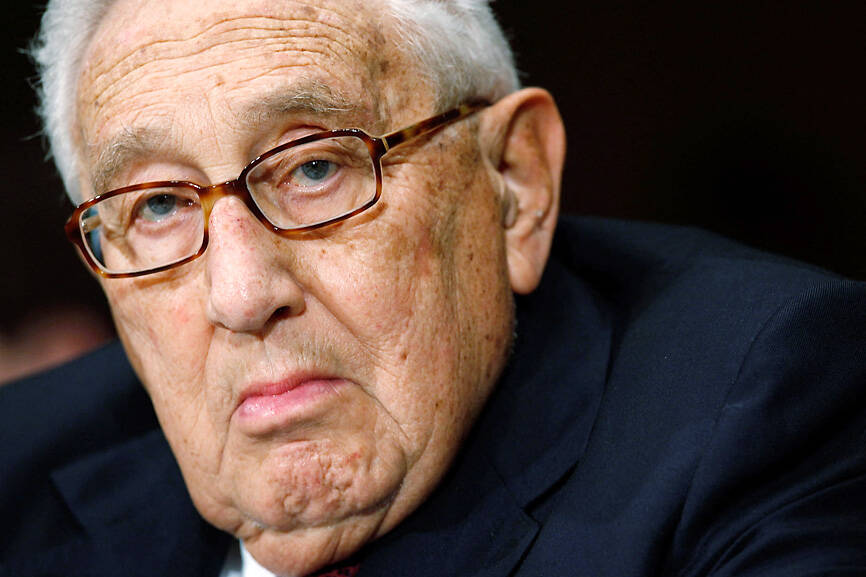Former US secretary of state Henry Kissinger, the diplomat with the thick glasses and gravelly voice who dominated foreign policy as the US extricated itself from Vietnam and broke down barriers with China, died on Wednesday, his consulting firm said.
He was 100.
With his gruff yet commanding presence and behind-the-scenes manipulation of power, Kissinger exerted uncommon influence on global affairs under US presidents Richard Nixon and Gerald Ford, earning vilification and the Nobel Peace Prize. Decades later, his name still provokes impassioned debate over foreign policy landmarks long past.

Photo: AFP
Kissinger’s power grew during the turmoil of Watergate, when the politically attuned diplomat assumed a role akin to copresident to the weakened Nixon.
“No doubt my vanity was piqued,” Kissinger later wrote of his expanding influence. “But the dominant emotion was a premonition of catastrophe.”
A Jew who fled Nazi Germany with his family in his teens, Kissinger in his later years cultivated the reputation of respected statesman, giving speeches, offering advice to Republicans and Democrats alike and managing a global consulting business. He turned up in former US president Donald Trump’s White House on multiple occasions.
However, Nixon-era documents and tapes, as they trickled out over the years, brought revelations — many in Kissinger’s own words — that sometimes cast him in a harsh light.
Never without his detractors, Kissinger after he left government was dogged by critics who argued that he should be called to account for his policies on Southeast Asia and support of repressive regimes in Latin America.
For eight restless years — first as national security adviser, later as secretary of state, and for a time in the middle holding both titles — Kissinger ranged across the breadth of major foreign policy issues. He conducted the first “shuttle diplomacy” in the quest for Middle East peace. He used secret channels to pursue ties between the US and China, ending decades of isolation and mutual hostility.
He initiated the Paris negotiations that ultimately provided a face-saving means — a “decent interval,” he called it — to get the US out of a costly war in Vietnam. Two years later, Saigon fell to the communists.
And he pursued a policy of detente with the Soviet Union that led to arms control agreements and raised the possibility that the tensions of the Cold War and its nuclear threat did not have to last forever.
SEE KISSINGER’S ON PAGE 5

‘CHARM OFFENSIVE’: Beijing has been sending senior Chinese officials to Okinawa as part of efforts to influence public opinion against the US, the ‘Telegraph’ reported Beijing is believed to be sowing divisions in Japan’s Okinawa Prefecture to better facilitate an invasion of Taiwan, British newspaper the Telegraph reported on Saturday. Less than 750km from Taiwan, Okinawa hosts nearly 30,000 US troops who would likely “play a pivotal role should Beijing order the invasion of Taiwan,” it wrote. To prevent US intervention in an invasion, China is carrying out a “silent invasion” of Okinawa by stoking the flames of discontent among locals toward the US presence in the prefecture, it said. Beijing is also allegedly funding separatists in the region, including Chosuke Yara, the head of the Ryukyu Independence

UNITED: The premier said Trump’s tariff comments provided a great opportunity for the private and public sectors to come together to maintain the nation’s chip advantage The government is considering ways to assist the nation’s semiconductor industry or hosting collaborative projects with the private sector after US President Donald Trump threatened to impose a 100 percent tariff on chips exported to the US, Premier Cho Jung-tai (卓榮泰) said yesterday. Trump on Monday told Republican members of the US Congress about plans to impose sweeping tariffs on semiconductors, steel, aluminum, copper and pharmaceuticals “in the very near future.” “It’s time for the United States to return to the system that made us richer and more powerful than ever before,” Trump said at the Republican Issues Conference in Miami, Florida. “They

GOLDEN OPPORTUNITY: Taiwan must capitalize on the shock waves DeepSeek has sent through US markets to show it is a tech partner of Washington, a researcher said China’s reported breakthrough in artificial intelligence (AI) would prompt the US to seek a stronger alliance with Taiwan and Japan to secure its technological superiority, a Taiwanese researcher said yesterday. The launch of low-cost AI model DeepSeek (深度求索) on Monday sent US tech stocks tumbling, with chipmaker Nvidia Corp losing 16 percent of its value and the NASDAQ falling 612.46 points, or 3.07 percent, to close at 19,341.84 points. On the same day, the Philadelphia Stock Exchange Semiconductor Sector index dropped 488.7 points, or 9.15 percent, to close at 4,853.24 points. The launch of the Chinese chatbot proves that a competitor can

‘VERY SHALLOW’: The center of Saturday’s quake in Tainan’s Dongshan District hit at a depth of 7.7km, while yesterday’s in Nansai was at a depth of 8.1km, the CWA said Two magnitude 5.7 earthquakes that struck on Saturday night and yesterday morning were aftershocks triggered by a magnitude 6.4 quake on Tuesday last week, a seismologist said, adding that the epicenters of the aftershocks are moving westward. Saturday and yesterday’s earthquakes occurred as people were preparing for the Lunar New Year holiday this week. As of 10am yesterday, the Central Weather Administration (CWA) recorded 110 aftershocks from last week’s main earthquake, including six magnitude 5 to 6 quakes and 32 magnitude 4 to 5 tremors. Seventy-one of the earthquakes were smaller than magnitude 4. Thirty-one of the aftershocks were felt nationwide, while 79